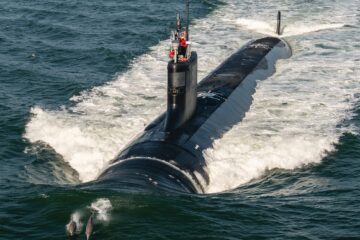France has been offering Scorpene for years. On February 10, 2022, Naval Group and Indonesian state-owned shipbuilder, PT PAL Indonesia, signed an MoU on the research, development, and construction of two Scorpene submarines. Since then, both sides have engaged in numerous negotiations to realise the plan to build two Scorpene at PT PAL’s submarine construction facility in Surabaya City, East Java.
During this period, Jakarta also received submarine proposals from other countries particularly Germany and South Korea.

In October 2023, Naval Group renewed its proposal by offering the latest variant of its Scorpene family of submarines called ‘Scorpene Evolved’. It features a full Lithium-Ion Batteries (LIBs) configuration allowing a total endurance of 80 days and an operational range of more than 8,000 nautical miles. Compared to the previous variant, the Scorpene Evolved will have a lower acoustic signature and, thanks to the LIBs, able to maintain its top speed for a longer duration.
The Evolved variant is being offered in a whole local production scheme and it is estimated that approximately one-third of the total contract value, estimated at about $2.1 billion, will return to Indonesia through offsets and other collaboration initiatives.

A month later, in November 2023, Naval Group CEO, Pierre Éric Pommellet, and Indonesian Deputy Minister of Defence, Gen. (Ret.) Muhammad Herindra, met in Jakarta to discuss Scorpene Evolved’s financing.
Indonesia’ Scorpene: Latest developments
Fast forward to March 21, 2024, PT PAL stated that up to 93% of its existing facilities can be used to build Scorpene and that the actual contract could be signed soon.
On March 26, during an online seminar organised by a Jakarta-based consulting company, Semar Sentinel Indonesia, a representative from the Republic of Indonesia Fleet Command mentioned Scorpene Evolved as one of the future platforms that is still being negotiated.
In addition, on March 27, a meeting was held between officials from PT PAL and the Indonesian Defence Industry Policy Committee (KKIP) to discuss PT PAL’s readiness to locally build Scorpene with Naval Group’s support. To note, KKIP has the authority to coordinate Indonesia’s national defence industry policy and is headed by the president and minister of defence.
Naval News understands an official announcement could be imminent. A French delegation consisting of top company officials visited Indonesia’s ministry of defense this week. This was confirmed by more than two sources.
Indonesia’s Naval Ambitions

Given the continuous technological developments as well as geopolitical dynamics and the desire to become a major regional security player, in recent years the Indonesian Navy (TNI AL) has become more outspoken in expressing its goal to operate a more modern and capable submarine fleet. This is also spurred by how other navies in the region are already or currently modernising their submarine fleets, thus leaving Indonesia behind in both quantity and quality.
Some of the key criteria for TNI AL’s future submarine fleet include long endurance, the ability to launch cruise missiles, and other future-proof aspects such as integration with unnamed platforms and systems.
TNI AL currently has four submarines in its inventory; one German-made Type-209/1300 and three South Korean-made Jang Bogo-class (Type-209/1400). Meanwhile, in its force design, TNI AL is supposed to operate a minimum of 12 submarines.
Given the need for more capable platforms and concern about the readiness of TNI AL’s existing submarine fleet, some may argue that the Type-209 design is no longer adequate to meet the country’s defence needs. This assessment is supported by the fact that many Type-209 users around the world such as Brazilian, Chilean, Indian, and Hellenic Navies have decided to transition to more advanced platforms.
The long-awaited plan to procure new submarines is also motivated by Jakarta’s ambition to turn defence spending into defence investment. Submarines have also been listed as one of the 10 defence platforms or systems whose technology should be mastered by the country’s domestic defence industry.
This is why foreign Original Equipment Manufacturers (OEMs) must strategically leverage their offset offers, including transfer of technology, domestic workforce absorption, and local production scheme, to increase the chance of securing major contracts from Jakarta.






